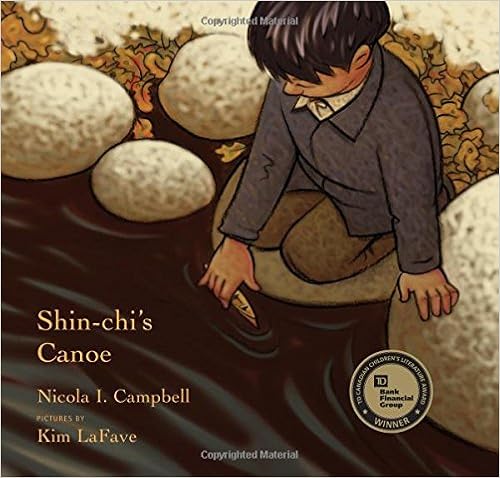Nicola writes adult and children's short fiction, poetry and has several works in progress including another free-verse picture book. She loves the outdoors; biking and hiking and has been participating in traditional cedar dug-out canoe racing for eleven years. She has a strong respect and an absolute belief in First Nation's spirituality, culture and tradition."
In the author's own words:
"I heard an elder speak of the importance of our languages and our culture. He said that our words are powerful; our stories are elastic; our languages are music: they dance, they move and they are medicine for our people. He said they are a spirit within themselves and we are only the channel that brings them to life. I write because I know what he said is true. Shi-shi-etko and Shin-chi's Canoe are inspired by stories that I heard from my family, elders and community. As a child, I didn't understand why my mom, aunties and uncles and the elders in our community were taken away. I didn't understand why as children, they weren't allowed to speak — Indian. I knew that because of what my grandparents went through, they did not teach my mom or aunts and uncles to speak Nlekepmxcin and this was a common decision among many parents at that time. As children, my cousins and I could not fathom why all First Nations children everywhere were taken from their parents and forced to attend these schools. These two books are my efforts to illustrate these two children finding strength and resilience within themselves along with finding as many adventures as they could find." - from www.strongnations.com
 Book Summary: In just four days young Shi-shi-etko will have to leave her family and all that she knows to attend residential school.
Book Summary: In just four days young Shi-shi-etko will have to leave her family and all that she knows to attend residential school.
She spends her last days at home treasuring the beauty of her world -- the dancing sunlight, the tall grass, each shiny rock, the tadpoles in the creek, her grandfather's paddle song. Her mother, father and grandmother, each in turn, share valuable teachings that they want her to remember. And so Shi-shi-etko carefully gathers her memories for safekeeping. Richly hued illustrations complement this gently moving and poetic account of a child who finds solace all around her, even though she is on the verge of great loss -- a loss that native people have endured for generations because of the residential schools system. - from amazon.ca
 Book Summary: When they arrive at school, Shi-shi-etko reminds Shinchi, her six-year-old brother, that they can only use their English names and that they can't speak to each other. For Shinchi, life becomes an endless cycle of church mass, school, and work, punctuated by skimpy meals. He finds solace at the river, clutching a tiny cedar canoe, a gift from his father, and dreaming of the day when the salmon return to the river — a sign that it’s almost time to return home. This poignant story about a devastating chapter in First Nations history is told at a child’s level of understanding. - from amazon.ca
Book Summary: When they arrive at school, Shi-shi-etko reminds Shinchi, her six-year-old brother, that they can only use their English names and that they can't speak to each other. For Shinchi, life becomes an endless cycle of church mass, school, and work, punctuated by skimpy meals. He finds solace at the river, clutching a tiny cedar canoe, a gift from his father, and dreaming of the day when the salmon return to the river — a sign that it’s almost time to return home. This poignant story about a devastating chapter in First Nations history is told at a child’s level of understanding. - from amazon.caMy Thoughts: I loved these two beautiful, gently told children's books. I would happily sit and read these with my 7 year old, but can just as easily see using these to introduce the topic of Residential Schools with a middle grade or junior high class. What I like about these books is that they focus on the children's strength, resilience, strong family bonds, strong communities and the value of their culture and beliefs. As much as we need stories that show the horrors, brutality and injustice of Residential schools, we also need to be reminded that these children weren't just subject TO something spirit-crushing, but that they were also removed FROM something nurturing and spiritual.
That said, we don't have to agree with their spiritual teachings and we don't have to condemn the religious beliefs of those who ran the schools - but we need to recognize that these children had homes, families and communities... the damage done extends far beyond the occasional abused child or an isolated case of a runaway here and there.
These are beautiful books that can be an important part of teaching our children about "our home on Native land".

Youre so cool! I dont suppose Ive read something like this before. So nice to find any individual with some authentic thoughts on this subject. realy thanks for beginning this up. this website is one thing that is wanted on the internet, someone with a bit originality. helpful job for bringing one thing new to the internet! online casino gambling
ReplyDelete